Cloneliness: On the Reproduction of Loneliness
Autor Prof Michael O'Sullivanen Limba Engleză Paperback – 24 mar 2021
| Toate formatele și edițiile | Preț | Express |
|---|---|---|
| Paperback (1) | 217.62 lei 6-8 săpt. | |
| Bloomsbury Publishing – 24 mar 2021 | 217.62 lei 6-8 săpt. | |
| Hardback (1) | 656.06 lei 6-8 săpt. | |
| Bloomsbury Publishing – 18 sep 2019 | 656.06 lei 6-8 săpt. |
Preț: 217.62 lei
Nou
Puncte Express: 326
Preț estimativ în valută:
41.65€ • 45.22$ • 34.98£
41.65€ • 45.22$ • 34.98£
Carte tipărită la comandă
Livrare economică 23 aprilie-07 mai
Preluare comenzi: 021 569.72.76
Specificații
ISBN-13: 9781501378355
ISBN-10: 150137835X
Pagini: 256
Dimensiuni: 152 x 229 mm
Greutate: 0.35 kg
Editura: Bloomsbury Publishing
Colecția Bloomsbury Academic
Locul publicării:New York, United States
ISBN-10: 150137835X
Pagini: 256
Dimensiuni: 152 x 229 mm
Greutate: 0.35 kg
Editura: Bloomsbury Publishing
Colecția Bloomsbury Academic
Locul publicării:New York, United States
Caracteristici
Offers news readings of often overlooked western engagements with loneliness, such as Henry James's artistic interrogation of loneliness, Frank O'Connor's work on the short story, The Lonely Voice, and David Foster Wallace's reading of the university as breeding ground for loneliness
Notă biografică
Michael O'Sullivan is Associate Professor in the Department of English at the Chinese University of Hong Kong. His recent publications include Weakness: A Literary and Philosophical History (Bloomsbury, 2014), Academic Barbarism, Universities, and Inequality (2016), and The Humanities in Contemporary Chinese Contexts (2016). He is the founding editor of the journal Hong Kong Studies.
Cuprins
Acknowledgments1. Introduction: Radical Embodied Cognitive Loneliness2. Loneliness as Method: Henry James and the "Essential Loneliness" of Artistic Practice 3. The "Lonely Voice" and "Submerged Population" in O'Connor, Joyce, and Mansfield: How Can We Live "Alone Together"? 4. Loneliness Is Part of the Job: "Sentimental Loneliness" in Carson McCullers and Richard Yates 5. Beating University Loneliness and Workplace Boredom: David Foster Wallace on "How to Keep Yourself Open to a Moment of the Most Supernal Beauty"6. Loneliness in a Selection of Japanese Philosophy and Fiction: Doi, Soseki, Nishida, Murakami, Murata [Section on Shintoism by Raphael Wung Cheong Chim]7. Filial Piety and Loneliness in a Selection of Chinese Novels: Cao Xueqin, Mo Yan, Dai Sijie, Ha Jin, Yiyun Li 8. "I Am Trash": How Student Stress and Self-Stratification Is Creating a Generation of "Interconnected Loners" [with Flora Ka Yi Mak]9. An Erotics of LonelinessNotesBibliographyIndex
Recenzii
Michael O'Sullivan has quickly become a major voice in the defense of enlightened approaches to teaching. Cloneliness is a clear-sighted and wide-ranging response to contemporary forms of connected isolation. What is particularly inspiring about O'Sullivan's approach is the manner in which he links his analysis so profoundly to the needs of his students, and does so in truly global contexts.
With his astute, even shimmering, cross-articulations of 'cloneliness,' Michael O'Sullivan is rapidly positioning himself among the forefront of affect theorists for our (post)digital age. In O'Sullivan's timely rendering, the telegram-like beat of his scholarly approach--'radical embodied cognitive loneliness'--assumes the contemporary guise of eerily penetrating fiberoptic pulses. 'Cloneliness' serves dark and unseen masters, as our desires to connect become thwarted by the pixelated trap of a market-driven, online existence. The antidote to such despair? The hard-fought perspicacity of O'Sullivan's driving intellect, which bids us--every last one of us facing the monitor's false dawn--to resist.
Through wide-ranging exploration of the theme of loneliness in neuroscience, informatics, biopolitics, education, arts, and popular culture, and by bringing in various texts of philosophy, religion, sociology, and literature from the East and West over different periods, Michael O'Sullivan demonstrates in Cloneliness: On the Reproduction of Loneliness how the concept of loneliness has changed, how people have struggled with the fatal condition as human beings, and how in a similar vein people nowadays are urged to be lonely and forced to inwardly connect with each other in an algorithmically controlled environment of education, career, and everyday life rooted in cyberspace. Cloneliness makes a significant contribution to the humanities in a digital global society, especially with its critique of education today.
With his astute, even shimmering, cross-articulations of 'cloneliness,' Michael O'Sullivan is rapidly positioning himself among the forefront of affect theorists for our (post)digital age. In O'Sullivan's timely rendering, the telegram-like beat of his scholarly approach--'radical embodied cognitive loneliness'--assumes the contemporary guise of eerily penetrating fiberoptic pulses. 'Cloneliness' serves dark and unseen masters, as our desires to connect become thwarted by the pixelated trap of a market-driven, online existence. The antidote to such despair? The hard-fought perspicacity of O'Sullivan's driving intellect, which bids us--every last one of us facing the monitor's false dawn--to resist.
Through wide-ranging exploration of the theme of loneliness in neuroscience, informatics, biopolitics, education, arts, and popular culture, and by bringing in various texts of philosophy, religion, sociology, and literature from the East and West over different periods, Michael O'Sullivan demonstrates in Cloneliness: On the Reproduction of Loneliness how the concept of loneliness has changed, how people have struggled with the fatal condition as human beings, and how in a similar vein people nowadays are urged to be lonely and forced to inwardly connect with each other in an algorithmically controlled environment of education, career, and everyday life rooted in cyberspace. Cloneliness makes a significant contribution to the humanities in a digital global society, especially with its critique of education today.
